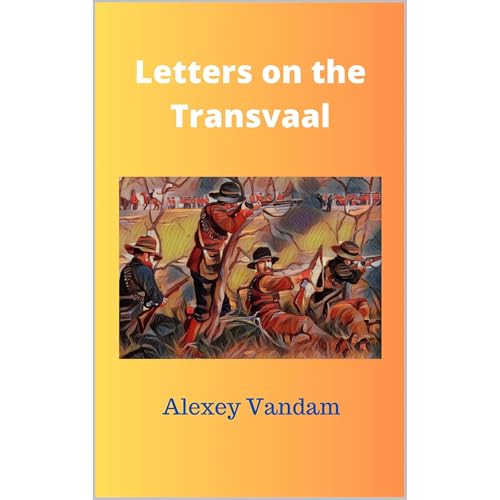
Letters on the Transvaal
No se pudo agregar al carrito
Solo puedes tener X títulos en el carrito para realizar el pago.
Add to Cart failed.
Por favor prueba de nuevo más tarde
Error al Agregar a Lista de Deseos.
Por favor prueba de nuevo más tarde
Error al eliminar de la lista de deseos.
Por favor prueba de nuevo más tarde
Error al añadir a tu biblioteca
Por favor intenta de nuevo
Error al seguir el podcast
Intenta nuevamente
Error al dejar de seguir el podcast
Intenta nuevamente
 Exclusivo para miembros Prime: ¿Nuevo en Audible? Obtén 2 audiolibros gratis con tu prueba.
Exclusivo para miembros Prime: ¿Nuevo en Audible? Obtén 2 audiolibros gratis con tu prueba.
Elige 1 audiolibro al mes de nuestra inigualable colección.
Acceso ilimitado a nuestro catálogo de más de 150,000 audiolibros y podcasts.
Accede a ofertas y descuentos exclusivos.
Premium Plus se renueva automáticamente por $14.95 al mes después de 30 días. Cancela en cualquier momento.
Compra ahora por $3.99
-
Narrado por:
-
Virtual Voice
-
De:
-
Alexey Vandam

Este título utiliza narración de voz virtual
Voz Virtual es una narración generada por computadora para audiolibros..
He goes to South Africa with Russian military funding due to his unexpectedly manifested abilities in journalism. The retired lieutenant is a freelance correspondent for the then popular “Novoe Vremya.” From Feb to June 1900 he published under the pseudonym “A. Vandam." Of greatest interest are his “Letters about the Transvaal” - notes from the first large-scale war of the 20th century.
Timeline:
Having retired on Nov 11, 1899, he soon hit the road. One of his first messages, dated Oct 22, 1899, was sent from Amsterdam (published in “New Time” on Nov 7, 1899), the next correspondence dated Nov 2, 1899 was sent from Paris. The next two messages from Dec 14 are from South Africa: from the port of Lorenzo Marchesa. The bulk of the essays were published in Novoye Vremya after Vandam’s arrival in St. Petersburg: from May 4 to June 5, 1900. During July-August, on the pages of the newspaper he only commented on messages coming from the theater of military operations.
In a memorandum from the Minister of War Kuropatkin to Emperor Nicholas II about Russian volunteers in the Anglo-Boer War, it is reported “of the 117th Yaroslavl Infantry Regiment, Staff Captain Edrikhin went into reserve for a trip to South Africa. .'..I received funds for the trip from Grand Duke Mikhailovich and corresponded in newspapers. I spent about two months in the theater of war'. Due to illness and the short duration of his stay in South Africa, he took little part in military operations. Everyone spoke of him as a very efficient officer.”* [*RGVIA. F. 401. D. 5, doc. 41].
Edrikhin’s return to Russia can be established, since literally a week after his arrival he was personally received by the Minister of War, General A. N. Kuropatkin, and had a long conversation with him. Their meeting took place on May 7, 1900. By chance or not, on May 6, Edrikhin had became a staff captain.
Thus, having arrived in South Africa on December 14, 1899, Edrikhin left it presumably at the end of March 1900 (the journey home took about a month and a half). The time spent directly in the Transvaal - at the theater of military operations, as noted above, was limited to two months (the second half of January - the first half of March 1900).
It seems that the main goal of Edrikhin’s reports from the Transvaal was not only to convey to his compatriots the truth about a distant war, but also to try to look at Russia through the prism of foreign experience gaining true patriotism and love for the Motherland.
He writes: “...our famous drunkenness is less terrible than that of other peoples, our laziness is not as great as we say, our ignorance is a thing that can be corrected with our common sense. Our embarrassment and self-deprecation in front of foreigners have no basis"* [*New Time. 02/05/1900].
Edrikhin's reports themselves are not only a story about what he saw in distant South Africa, but a deep, impartial analysis of the causes and consequences of the war that arose. Including its influence on Russia (weakening the expansionist aspirations of England in the Caucasus and Central Asia). Therefore, the Transvaal Letters can be considered a classic example of geopolitical analysis of world events.
Returning from the Transvaal, on June 13, 1900, he was re-enlisted, and two months later, on August 17, 1900, he was seconded to the Main Quartermaster Department to carry out official duties in the quartermaster unit. Thus, a fairly calm service in the capital begins for Edrikhin. However, this, apparently, did not suit the active nature of Staff Captain Edrikhin much - in the spring of 1901 he again submitted his resignation.
Todavía no hay opiniones


